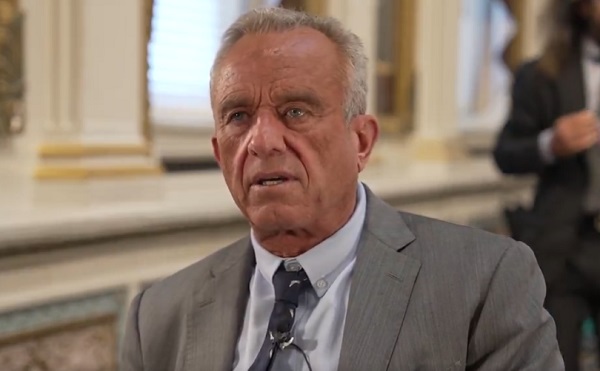Business
Mark Carney’s carbon tax plan hurts farmers

From the Canadian Taxpayers Federation
Liberal leadership front-runner Mark Carney recently announced his carbon tax plan and here are some key points.
It’s expensive for Canadians.
It’s even more expensive for farmers.
Carney announced he would immediately remove the consumer carbon tax if he became prime minister.
That sounds like good news, but it’s important to read the fine print.
Carney went on and announced that he would be “integrating a new consumer carbon credit market into the industrial pricing system.” Carney also said he would “improve and tighten” the industrial carbon tax and impose carbon tax tariffs on imports into Canada.
If that sounds like Carney isn’t getting rid of the carbon tax, that’s because he isn’t. He’s trying to hide the costs from Canadians by imposing higher carbon taxes on businesses.
What that means is that Carney’s plan would tax businesses and then businesses will pass those costs onto consumers.
That also means farmers.
Under the current carbon tax, farmers have an exemption from the carbon tax on the gas and diesel they use on their farm. The hidden industrial carbon tax is applied directly to industry. Businesses are forced to pay the carbon tax if they emit above the government’s prescribed limit.
But businesses don’t just swallow those costs. They pass them on. The trucking industry is a great example.
“Due to razor thin margins in the trucking industry, these added costs cannot be absorbed and must be passed on to customers,” said the Canadian Trucking Alliance when analyzing the current Trudeau carbon tax.
The same concept applies to the Carney scheme.
If Carney removes the consumer carbon tax and replaces it with a higher tax on businesses under the hidden industrial carbon tax, that means more costs for farmers.
There isn’t any exemption for farmers under the industrial carbon tax. Oil and gas refineries will be paying a higher carbon tax and they will be forced to pass that cost onto their consumers. Farmers use a lot of fuel.
The pain doesn’t stop there. Farmers also use a lot of fertilizer and Carney’s carbon tax means higher costs for fertilizer plants. Then farmers will be stuck paying more for fertilizer.
Some businesses, like those fertilizer plants, could pack up and move production south. But farmers are still going to need fertilizer. Carney’s plan compounds the pain with carbon tax tariffs.
Fertilizer is only one example. If Canadian farmers need to buy a part to fix equipment that can only come from the U.S., it could be more expensive because of Carney’s carbon tax tariffs.
This will hurt Canadian farmers when they’re buying supplies. But it’ll also hurt when farmers when they go to market. Canadian farmers compete with farmers around the world and majority of them aren’t paying carbon taxes.
Farmers wouldn’t be at a disadvantage because American farmers are smarter or farm better, but because, under Carney’s carbon tax, they would be stuck paying costs competitors don’t have to pay. And farmers know this all too well.
“My competitors to the south of me in the United States do not pay that [carbon] tax, so now my cost goes up and I have no alternative,” said Jeff Barlow, a corn, wheat and soybean farmer in Ontario. “By penalizing me there’s nothing else that I can do but just be penalized.”
And if farmers won’t be the only ones hurt.
Families across Canada are struggling with grocery prices and increasing the cost of production for farmers certainly won’t lower those prices.
Carney says that he wants to cancel the consumer tax because it’s too “divisive.” That statement misses the nail completely and hammers the thumb. Canadians don’t want to get rid of the carbon tax because of perception, they want to get rid of it because it makes life more expensive.
Carney needs to commit to getting rid of carbon taxes, not rebranding the failed policy into something that could end up costing Canadians and farmers even more.
Business
Cuba has lost 24% of it’s population to emigration in the last 4 years

 MxM News
MxM News
Quick Hit:
A new study finds Cuba has lost nearly a quarter of its population since 2020, driven by economic collapse and a mass emigration wave unseen outside of war zones. The country’s population now stands at just over 8 million, down from nearly 10 million.
Key Details:
- Independent study estimates Cuba’s population at 8.02 million—down 24% in four years.
- Over 545,000 Cubans left the island in 2024 alone—double the official government figure.
- Demographer warns the crisis mirrors depopulation seen only in wartime, calling it a “systemic collapse.”
Diving Deeper:
Cuba is undergoing a staggering demographic collapse, losing nearly one in four residents over the past four years, according to a new study by economist and demographer Juan Carlos Albizu-Campos. The report estimates that by the end of 2024, Cuba’s population will stand at just over 8 million people—down from nearly 10 million—a 24% drop that Albizu-Campos says is comparable only to what is seen in war-torn nations.
The study, accessed by the Spanish news agency EFE, points to mass emigration as the primary driver. In 2024 alone, 545,011 Cubans are believed to have left the island. That number is more than double what the regime officially acknowledges, as Cuba’s government only counts those heading to the United States, ignoring large flows to destinations like Mexico, Spain, Serbia, and Uruguay.
Albizu-Campos describes the trend as “demographic emptying,” driven by what he calls a “quasi-permanent polycrisis” in Cuba—an interwoven web of political repression, economic freefall, and social decay. For years, Cubans have faced food and medicine shortages, blackout-plagued days, fuel scarcity, soaring inflation, and a broken currency system. The result has been not just migration, but a desperate stampede for the exits.
Yet, the regime continues to minimize the damage. Official figures from the National Office of Statistics and Information (ONEI) put Cuba’s population at just over 10 million in 2023. However, even those numbers acknowledge a shrinking population and the lowest birth rate in decades—confirming the crisis, if not its full scale.
Cuba hasn’t held a census since 2012. The last scheduled one in 2022 has been repeatedly delayed, allegedly due to lack of resources. Experts doubt that any new attempt will be transparent or complete.
Albizu-Campos warns that the government’s refusal to confront the reality of the collapse is obstructing any chance at solutions. More than just a demographic issue, the study describes Cuba’s situation as a “systemic crisis.”
“Havana (Cuba, February 2023)” by Bruno Rijsman licensed under CC BY-SA 2.0 DEED.
Business
Tariff-driven increase of U.S. manufacturing investment would face dearth of workers

From the Fraser Institute
Since 2015, the number of American manufacturing jobs has actually risen modestly. However, as a share of total U.S. employment, manufacturing has dropped from 30 per cent in the 1970s to around 8 per cent in 2024.
Donald Trump has long been convinced that the United States must revitalize its manufacturing sector, having—unwisely, in his view—allowed other countries to sell all manner of foreign-produced manufactured goods in the giant American market. As president, he’s moved quickly to shift the U.S. away from its previous embrace of liberal trade and open markets as cornerstones of its approach to international economic policy —wielding tariffs as his key policy instrument. Since taking office barely two months ago, President Trump has implemented a series of tariff hikes aimed at China and foreign producers of steel and aluminum—important categories of traded manufactured goods—and threatened to impose steep tariffs on most U.S. imports from Canada, Mexico and the European Union. In addition, he’s pledged to levy separate tariffs on imports of automobiles, semi-conductors, lumber, and pharmaceuticals, among other manufactured goods.
In the third week of March, the White House issued a flurry of news releases touting the administration’s commitment to “position the U.S. as a global superpower in manufacturing” and listing substantial new investments planned by multinational enterprises involved in manufacturing. Some of these appear to contemplate relocating manufacturing production in other jurisdictions to the U.S., while others promise new “greenfield” investments in a variety of manufacturing industries.
President Trump’s intense focus on manufacturing is shared by a large slice of America’s political class, spanning both of the main political parties. Yet American manufacturing has hardly withered away in the last few decades. The value of U.S. manufacturing “output” has continued to climb, reaching almost $3 trillion last year (equal to 10 per cent of total GDP). The U.S. still accounts for 15 per cent of global manufacturing production, measured in value-added terms. In fact, among the 10 largest manufacturing countries, it ranks second in manufacturing value-added on a per-capita basis. True, China has become the world’s biggest manufacturing country, representing about 30 per cent of global output. And the heavy reliance of Western economies on China in some segments of manufacturing does give rise to legitimate national security concerns. But the bulk of international trade in manufactured products does not involve goods or technologies that are particularly critical to national security, even if President Trump claims otherwise. Moreover, in the case of the U.S., a majority of two-way trade in manufacturing still takes place with other advanced Western economies (and Mexico).
In the U.S. political arena, much of the debate over manufacturing centres on jobs. And there’s no doubt that employment in the sector has fallen markedly over time, particularly from the early 1990s to the mid-2010s (see table below). Since 2015, the number of American manufacturing jobs has actually risen modestly. However, as a share of total U.S. employment, manufacturing has dropped from 30 per cent in the 1970s to around 8 per cent in 2024.
| U.S. Manufacturing Employment, Select Years (000)* | |
|---|---|
| 1990 | 17,395 |
| 2005 | 14,189 |
| 2010 | 14,444 |
| 2015 | 12,333 |
| 2022 | 12,889 |
| 2024 | 12,760 |
| *December for each year shown. Source: U.S. Bureau of Labor Statistics | |
Economists who have studied the trend conclude that the main factors behind the decline of manufacturing employment include continuous automation, significant gains in productivity across much of the sector, and shifts in aggregate demand and consumption away from goods and toward services. Trade policy has also played a part, notably China’s entry into the World Trade Organization (WTO) in 2001 and the subsequent dramatic expansion of its role in global manufacturing supply chains.
Contrary to what President Trump suggests, manufacturing’s shrinking place in the overall economy is not a uniquely American phenomenon. As Harvard economist Robert Lawrence recently observed “the employment share of manufacturing is declining in mature economies regardless of their overall industrial policy approaches. The trend is apparent both in economies that have adopted free-market policies… and in those with interventionist policies… All of the evidence points to deep and powerful forces that drive the long-term decline in manufacturing’s share of jobs and GDP as countries become richer.”
This brings us back to the president’s seeming determination to rapidly ramp up manufacturing investment and production as a core element of his “America First” program. An important issue overlooked by the administration is where to find the workers to staff a resurgent U.S. manufacturing sector. For while manufacturing has become a notably “capital-intensive” part of the U.S. economy, workers are still needed. And today, it’s hard to see where they will be found. This is especially true given the Trump administration’s well-advertised skepticism about the benefits of immigration.
According to the U.S. Bureau of Labor Statistics, the current unemployment rate across America’s manufacturing industries collectively stands at a record low 2.9 per cent, well below the economy-wide rate of 4.5 per cent. In a recent survey by the National Association of Manufacturers, almost 70 per cent of American manufacturers cited the inability to attract and retain qualified employees as the number one barrier to business growth. A cursory look at the leading industry trade journals confirms that skill and talent shortages remain persistent in many parts of U.S. manufacturing—and that shortages are destined to get worse amid the expected significant jump in manufacturing investment being sought by the Trump administration.
As often seems to be the case with Trump’s stated policy objectives, the math surrounding his manufacturing agenda doesn’t add up. Manufacturing in America is in far better shape than the president acknowledges. And a tariff-driven avalanche of manufacturing investment—should one occur—will soon find the sector reeling from an unprecedented human resource crisis.
Jock Finlayson
Senior Fellow, Fraser Institut
-

 Health2 days ago
Health2 days agoRFK Jr. says ‘everything is going to change’ with CDC vaccine policy in Michael Knowles interview
-

 Business2 days ago
Business2 days agoLabor Department cancels “America Last” spending spree spanning five continents
-

 2025 Federal Election2 days ago
2025 Federal Election2 days agoNext federal government should recognize Alberta’s important role in the federation
-

 Addictions2 days ago
Addictions2 days agoThere’s No Such Thing as a “Safer Supply” of Drugs
-

 Economy1 day ago
Economy1 day agoClearing the Path: Why Canada Needs Energy Corridors to Compete
-

 2025 Federal Election12 hours ago
2025 Federal Election12 hours ago2025 Federal Election Interference from China! Carney Pressed to Remove Liberal MP Over CCP Bounty Remark
-

 Uncategorized11 hours ago
Uncategorized11 hours agoPoilievre on 2025 Election Interference – Carney sill hasn’t fired Liberal MP in Chinese election interference scandal
-

 2025 Federal Election2 days ago
2025 Federal Election2 days agoCanadian Banks Tied to Chinese Fentanyl Laundering Risk U.S. Treasury Sanctions After Cartel Terror Designation










